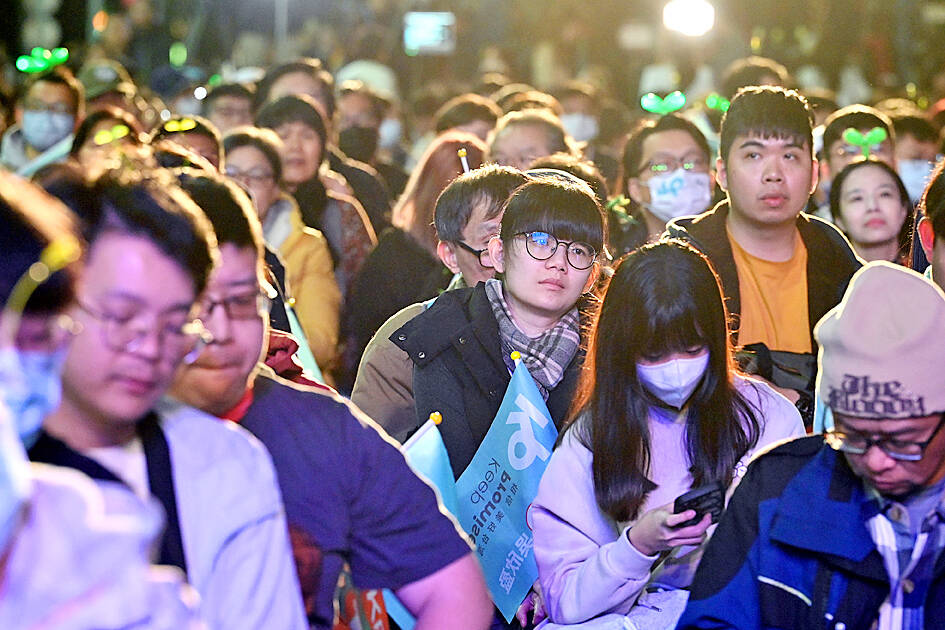Psychiatrists and a psychologist suggested that those who develop post-election stress, such as feeling overexcited, frustrated, depressed, disappointed and lost, could try focusing on things they can control, exercise and avoid news and the media, but that they should seek professional help if it affects their eating and sleeping habits.
Post-election stress is not a scientific diagnosis, but refers to stress caused by an election and its physical and mental impacts.
Lin Chu-chun (林竺君), a psychiatrist at Far Eastern Memorial Hospital in New Taipei City, on Saturday said a study by the American Psychological Association suggests that people who are more invested in political issues, those who have more political associations and those who rely more on news media are more likely to have post-election stress, especially if their preferred candidate lost.

Photo: Wang Yi-sung, Taipei Times
When facing a result that does not measure up to their expectations, some might feel lost, sad, concerned, angry or irritated, and might even become violent, causing harm to themselves or others, she said.
They could try focusing more on what they can control, maintaining a routine lifestyle and work, and keeping contact with friends and family to reduce stress, Lin said, adding that they should avoid alcohol, drugs or non-prescription drugs to cope with stress.
Taipei Counseling Psychologists Association chairperson Lan Yi-feng (藍挹丰) said Taiwan has held several elections, so most people should have experience in adjusting their mental state after an election, properly relieving overly excited or depressed emotions, or they could seek professional assistance.
Those who are more interested in politics might have higher expectations for election results and their emotions might be more easily aroused, so they should take special care to not become overly excited if the result matches their expectation, as they might act impulsively when hyped up, she said.
Election results are a demonstration of a democratic society, but they are only temporary, meaning people do not need to stress themselves about winning or losing, as living their life well is more important, Lan said.
If they cannot calm down after a period of time, they could seek professional help to assess how much the result has affected their physical and mental condition, as well as their daily life functioning and find a suitable treatment plan, she added.
Psychiatrist Yang Tsung-tsair (楊聰財) also recommends that people exercise or engage in recreational activities to maintain good mental health and stable emotions, avoid participating in political discussions and be selective about the news and social media they use, but that if they develop a sleeping disorder that lasts longer than one week, they should seek professional medical assistance.

An essay competition jointly organized by a local writing society and a publisher affiliated with the Chinese Communist Party (CCP) might have contravened the Act Governing Relations Between the People of the Taiwan Area and the Mainland Area (臺灣地區與大陸地區人民關係條例), the Mainland Affairs Council (MAC) said on Thursday. “In this case, the partner organization is clearly an agency under the CCP’s Fujian Provincial Committee,” MAC Deputy Minister and spokesperson Liang Wen-chieh (梁文傑) said at a news briefing in Taipei. “It also involves bringing Taiwanese students to China with all-expenses-paid arrangements to attend award ceremonies and camps,” Liang said. Those two “characteristics” are typically sufficient

A magnitude 5.9 earthquake that struck about 33km off the coast of Hualien City was the "main shock" in a series of quakes in the area, with aftershocks expected over the next three days, the Central Weather Administration (CWA) said yesterday. Prior to the magnitude 5.9 quake shaking most of Taiwan at 6:53pm yesterday, six other earthquakes stronger than a magnitude of 4, starting with a magnitude 5.5 quake at 6:09pm, occurred in the area. CWA Seismological Center Director Wu Chien-fu (吳健富) confirmed that the quakes were all part of the same series and that the magnitude 5.5 temblor was

The brilliant blue waters, thick foliage and bucolic atmosphere on this seemingly idyllic archipelago deep in the Pacific Ocean belie the key role it now plays in a titanic geopolitical struggle. Palau is again on the front line as China, and the US and its allies prepare their forces in an intensifying contest for control over the Asia-Pacific region. The democratic nation of just 17,000 people hosts US-controlled airstrips and soon-to-be-completed radar installations that the US military describes as “critical” to monitoring vast swathes of water and airspace. It is also a key piece of the second island chain, a string of

The Central Weather Administration has issued a heat alert for southeastern Taiwan, warning of temperatures as high as 36°C today, while alerting some coastal areas of strong winds later in the day. Kaohsiung’s Neimen District (內門) and Pingtung County’s Neipu Township (內埔) are under an orange heat alert, which warns of temperatures as high as 36°C for three consecutive days, the CWA said, citing southwest winds. The heat would also extend to Tainan’s Nansi (楠西) and Yujing (玉井) districts, as well as Pingtung’s Gaoshu (高樹), Yanpu (鹽埔) and Majia (瑪家) townships, it said, forecasting highs of up to 36°C in those areas